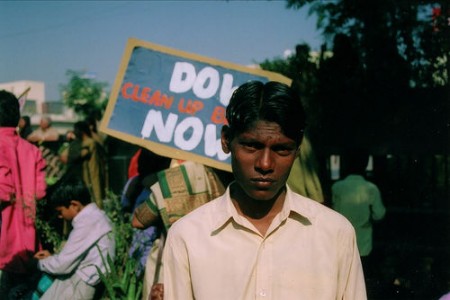
The ongoing BP oil spill in the Gulf of Mexico and and the 1984 Bhopal disaster have been hot topics in the news as of late. Both events have reproduced a popular debate regarding multinationals using and abusing their host countries, particularly within the environmental context. But rather than analyzing the power of the multinational companies in relation to the state, what appears more noteworthy is the conflicting attitude of the US. This in turn has influenced the hierarchy of states that exists on the world stage.
What I find interesting is how aggressively the US has condemned BP’s activities, even in the face of damaging trans-Atlantic relations. Yet, it has been so passive about the extensive damage done by American Union Carbide Chemicals, now Dow Chemicals, in Bhopal.
Some food for thought: Eleven people died in the BP incident, whereas 22,000 people died in Bhopal. In the latter case, none of the responsible American executives were extradited and even the Indian managers were released on bail immediately. Twenty six years later we find that only $500 were given to each victim (covering only a year of medical care) and approximately $10,000 in fines, versus BP’s estimated compensation of over $1bn. Further, these fines do not offset the 425 tons of waste that still remain in Bhopal. So how concerned is the US about global environmental issues and hazards and the problems of individual states? Are its strategies solely indicative of what is most advantageous?
It would appear that the developing states also have a hand in reproducing the exploitative vicious cycle that the multinational companies establish in their host countries, recreating a similar power dynamic to the colonial/imperialistic era. For example, the government in Papua New Guinea recently altered environmental laws making it difficult to prosecute mining projects that damage the environment. Therefore if an oil spill were to occur, the company would not be held liable.
Both worlds have become focused on making short-term economic gains at the risk of depleting future resources as well as impinging permanent environmental and health damage. However, the difference lies in their approach. The US and other developed countries usually only harm the developing countries they are using, i.e. US in Bhopal; China in Papua New Guinea. Building on the idea of double standards, one finds that they are careful about maintaining the wellbeing of their society. The developing world on the other hand, seems more than happy to allow for the destruction of their own state.
It would appear that the world has not changed so much in the last 50 years, and governments are as self-interested now as they have ever been. Only today, some countries more than others, have mastered the art of tact and diplomacy.
Is it ever possible to break out of this imperialistic hierarchy that has dominated history?
Update : It is worth noting that the leniency of the Indian Government in the Bhopal case may stem from a desire to have more cash in their pockets, as the BJP accepted a subtle ‘donation‘ from Dow Chemicals (Rs 1 lakh/$2000) in 2006-2007. Further, in both the Bhopal and Papa New Guinea cases, investment trumped resource salvation.

